100s are in prison for being gay
Colin Stewart is a 45-year journalism veteran living in Southern…
This page is revised — again and again — as new information is received. Latest update: February 8, 2025)
Worldwide, hundreds of people are in prison or awaiting trial for allegedly violating laws that punish those who are LGBTQ+.
The prison sentences that have been imposed range up to nine years, which is actually toward the lower end of punishments that are on the books in the 70-plus countries where homosexuality is currently illegal.
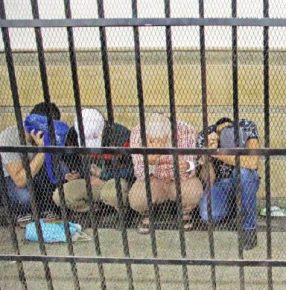
In the past, this blog tried to keep track of individual cases of LGBTI prisoners and defendants, but the number of cases turned out to be too great to continue. Now, the blog will provide an overview of the most repressive countries and, when possible, will update the list with news of arrests that violate the human rights of LGBTI people.
Finding out about specific cases remains difficult, especially in countries without a free press. Even though this list is depressing, it provides only a narrow window into one of many types of injustice affecting lesbian, gay, bisexual, transgender and intersex people, sometimes with fatal results. (See the section “Other injustices facing LGBTI people” below and the separate article “10 nations where the penalty for gay sex is death.”)
At present, the most egregious violators of LGBTI peoples’ human rights include these countries:
- Egypt (“one of the world’s biggest jailers of gay men,” where LGBTI community leaders estimate that as many as 500 LGBTI people have been sent to prison.)
- Saudi Arabia (In one recent year, religious police reportedly arrested and convicted a total of 260 people.)
- Morocco (Dozens of trials for same-sex intimacy are cited by LGBTI rights advocates each year, but are rarely reported in the media.)
- Nigeria (Dozens of arrests have been reported, as well as several mass arrests, but Nigerian media rarely follow up with reports about any subsequent trials).
- Tunisia (Arrests and trials of Tunisian citizens on homosexuality charges occur often, despite being strongly criticized by local and international human rights groups.)
100s IMPRISONED FOR HOMOSEXUALITY
>ALGERIA
Algerian law provides for prison sentences of two months to two years for homosexual activity.
“In July 2020, 44 people in Constantine province were arrested and
charged for allegedly organising and participating in a ‘same-sex wedding’ between two men. In September 2020 two individuals from the group were sentenced to three years in prison, and two others to one year in prison each, despite the group reportedly claiming that the event was a birthday party, and not a wedding.” (State Sponsored Homophobia, ILGA, December 2020 update)
>BURUNDI
Burundian law provides for prison sentences of three months to two years for homosexual activity.
“In October 2017, several outlets reported that numerous people had been arrested for ‘engaging in homosexuality’ and forced to pay exorbitant bribes for their release after a ‘hunt’ was announced that month.” (State Sponsored Homophobia, ILGA, December 2020 update)
>CAMEROON
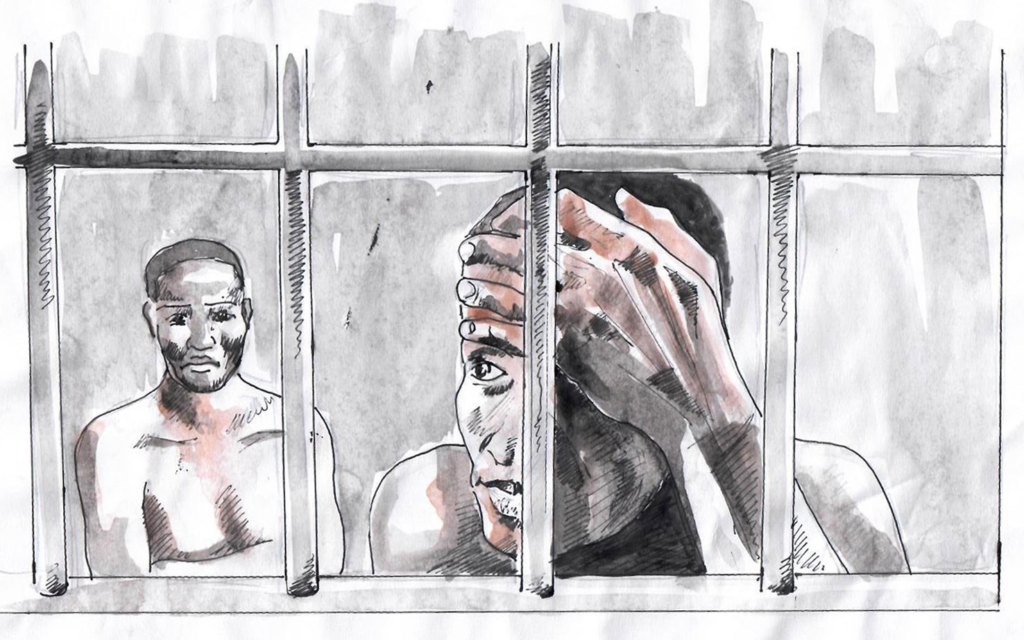
Cameroonian law provides for sentences of up to five years for homosexual activity.
Project Not Alone
As part of its Project Not Alone / Pas Seul this site and its donors have fed and freed 46 victims of African homophobia. All had been detained under the anti-gay laws of Cameroon and Nigeria.
Cornelius Fonya: Seized by a mob that took him to police
9 years in prison. Sentenced Nov. 20, 2013.
Police in the coastal city of Limbe arrested Cornelius Fonya on Oct. 29, 2012, on homosexuality charges after a mob seized him and delivered him to the police station. He pleaded not guilty and was unable to raise the money demanded for bail. In 2013, he was sentenced to nine years in prison for having sexual relations with a 19-year-old youth. The usual maximum in Cameroon for same-sex relations is a five-year sentence, but the penalty is doubled for sex with someone between ages 16 and 21.
5 gay-rights arrests; 6 days in jail and counting
April 2018: Five LGBTI rights advocates in western Cameroon were arrested and held for days at the local police station on suspicion of homosexuality.
Cameroon: Four gay men arrested, beaten in Kekem
June 2020: Police in the western region of Cameroon arrested four men who were beaten until they acknowledged that they were gay. They pleaded guilty and were given light sentences (a month in prison for one man, fines of about $91 for the others).
Feb. 8, 2021: Trans celebrity Shakiro arrested in Douala, Cameroon
Feb. 11, 2021: Police arrest 12 teens on homosexuality charges
After intervention by LGBTI rights advocates, most of them were promptly released.
>EGYPT
Egyptian police typically arrest LGBT people on charges of “sexual immorality” or “debauchery,” which Egyptian courts have ruled includes consensual homosexual activity.
Leaders of the underground LGBTI community in Egypt say that their country has become one of the world’s biggest jailers of gay men, with as many as 500 behind bars on “morals” charges. The New York Times estimates that “at least 250 lesbian, gay, bisexual and transgender people have been arrested in a quiet crackdown” since 2013.
A court sentenced four men to up to eight years in prison on April 7, 2014, for practicing homosexuality, a judicial official said. Prosecutors had accused the men of holding “deviant parties” and dressing in women’s clothes. Three were sentenced to eight years and the fourth to three years in prison.
Ten people were arrested in November 2013 at party in a residential area of the western Cairo suburb known as 6 October City. One male defendant was sentenced to nine years in prison; other male defendants, to three years. One woman was acquitted.
> GHANA
Ghanaian law provides for sentences of up to three years for homosexual activity.
“Several arrests of adults for consensual same-sex sexual acts have been documented in recent years. Detentions oftentimes involve psychological abuse, damaging media exposure and medical examinations. Local police are reportedly known to entrap and lure LGBT individuals (predominantly gay men) through social media. In September 2020, local media indicated that 11 lesbian women were arrested in the city of Aflao, in the Volta region, after a video of two of them reportedly engaging in sexual acts became known. (State Sponsored Homophobia, ILGA, December 2020 update)
> INDONESIA
The country as a whole does not have a law against same-sex intimacy, but two large provinces and several cities do. These are the punishments they call for:
- Aceh Province: 100 lashes, up to eight years in prison.
- South Sumatra Province: Punishment unspecified.
- Padang Panjang, West Sumatra: Up to three months.
- Pariaman, West Sumatra: Punishment unspecified.
- Tasikmalava, West Java: Punishment unspecified.
- Banjar District, West Java: Punishment unspecified.
Arrests have included these:
- Ten women accused of being lesbians were arrested in West Sumatra after a police found pictures on Facebook of two of them kissing and hugging. (November 2018)
- LGBT repression grows in Indonesia, with 141 arrests, public caning (May 2017)
- In September 2020, nine men were arrested in Jakarta following a raid on a private party and charged with “committing or facilitating obscene acts with another person”.
- In October 2020, the Semarang Military Court sentenced a soldier to one year’s imprisonment and dismissal from military duty for having same-sex
intercourse.
> IRAN
Iranian law provides for the death penalty in some cases of consensual same-sex relations both for men and women. Overall, Iran imposes the death penalty more often than any other country except China, but it is unclear how often — or if — it is applied for consensual homosexual activity.
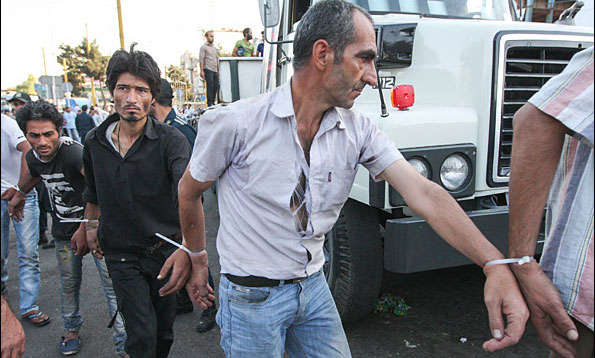
24 reported arrested and detained
Arrests were made Oct. 8, 2013. The 25 people arrested were reportedly blindfolded and taken to an unknown location. Within a few days they were freed on bail to await trial.
Revolutionary guards in Iran’s
province made at least 24 arrests (“dozens”) at a birthday party. They claimed that the arrests resulted from a lengthy investigation into a “a network of homosexuals and devil-worshippers.” In an update several weeks after the arrests, activist analyst Scott Long noted that “these cases can drag on for years without a hearing.” He added, “My guess is that a lot of [the people arrested] have gone into hiding (i.e. moved to other cities) or, since Kermanshah is near the border, crossed into Iraq — or even to Turkey to claim refugee status.”
“There have been reports of executions by hanging for consensual same-sex sexual relations and alleged same-sex rapes. There have been
several confirmed reports of state-led raids on private parties followed by mass arrests of those suspected of homosexuality. In September 2020, 6Rang released a report with testimonies of people who had been arrested by the police because of their diverse sexual orientation or gender identity.” (State Sponsored Homophobia, ILGA, December 2020 update)
>MALAWI
Under Malawian law, homosexual activity is punishable by up to 14 years in prison.
3 men serving prison terms of 10 to 14 years
LGBTQI advocates fault police actions
Amon Champyuni, Mathews Bello and Musa Chiwisi were convicted and sentenced in 2011 for violating Malawi’s anti-sodomy law. They are now serving sentences ranging from 10 to 14 years. The country’s High Court supposedly is reviewing the constitutionality of the anti-sodomy law, and Malawi’s justice minister has responded by instructing police to stop making arrests for alleged violations of it. But the three men remained in prison on the basis of the previous convictions while the High Court reviewed their cases.
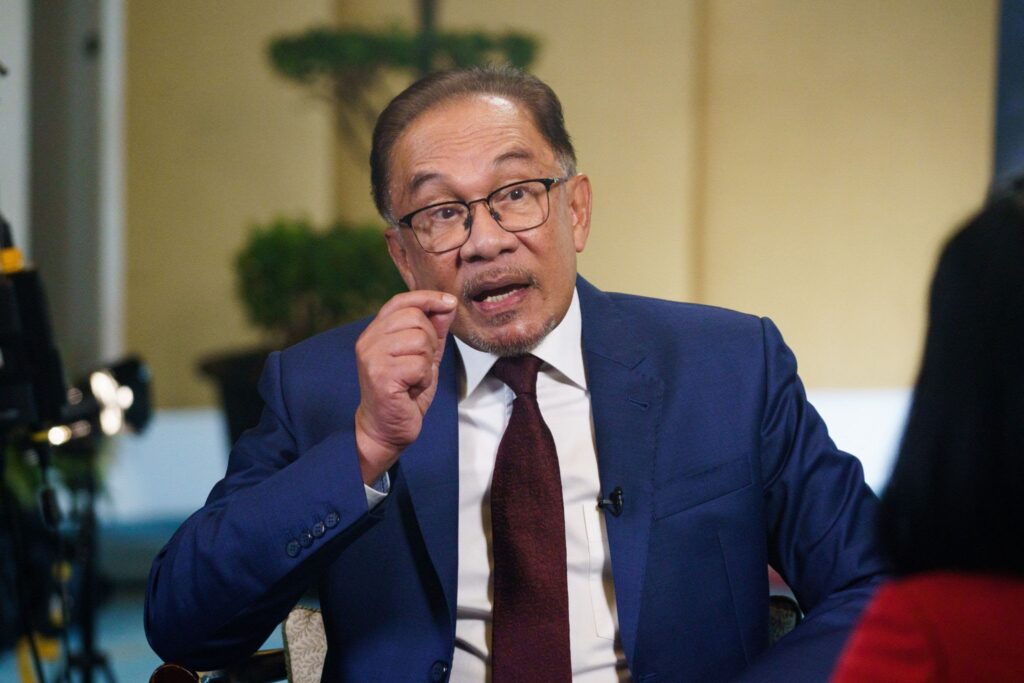
> MALAYSIA
Under Malaysian law, a prison sentence of up to 20 years is provided for “intercourse against the order of nature,” including homosexual activity.
Opposition politician stymied by prison sentence for sodomy
A Malaysian court in March 2014 sentenced opposition leader Anwar Ibrahim to five years in prison on sodomy charges, overturning an earlier acquittal and ending his hopes of contesting a local election. He was offered asylum abroad, but declined. His conviction was politically motivated, he said.
In 2018, after a new prime minister took office, Anwar was set free. In the fall of 2018, as president of the People’s Justice Party, Anwar said Malaysia’s anti-sodomy laws are unfair, outdated, and need to be reviewed. In 2022, he was elected prime minister of Malaysia.
> MAURITANIA
Mauritanian law provides for the death penalty for homosexual activity between men, but no one has actually been executed, at least not since the 1980s. For lesbian activity, the law provides a penalty of three mnths to two years in prison.
In January 2020, 10 men were arrested at a suspected “gay wedding” that turned out to be a birthday party. Eight of the men were given a two-year prison sentence that was reduced to six months with a warning that the original sentence would be restored for anyone who “reoffended” within the next five years.
>MOROCCO
Under Moroccan law, a prison sentence of up to three years is provided for homosexual activity.
Dozens of arrests go unreported in Morocco
Most homosexuality-related trials in Morocco are not publicized. According to an Associated Press account, the Ministry of Justice reported that 81 such trials occurred in 2011. The Moroccan LGBT activist group Kifkif says that more than 5,000 homosexuals have been put on trial since the country’s independence in 1956. That’s an average of about 86 per year. This blog has not been able to verify those figures.
The LGBT support group Aswat said that it tallied 19 prosecutions on homosexuality charges during the first three months of 2016.
A report from the Chief Public Prosecutor stated that 170 people faced homosexuality charges in 2018.
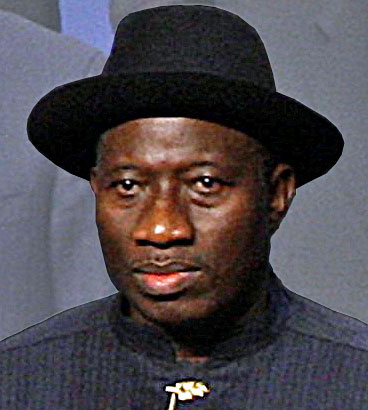
> NIGERIA
Nigerian law provides for sentences of up to 14 years for homosexual activity. In parts of northern Nigeria where sharia law applies, the death penalty can be applied for same-sex intercourse between males, at least in theory. A 2014 national law provides for prison sentences of 14 years for getting married to a member of the same sex and 10 years for belonging to a gay organization, supporting same-sex marriages, or making a public display of same-sex affection.
Compiling a comprehensive list of people incarcerated for violations of anti-gay laws in Nigeria is currently impossible. Nigerian newspapers typically report arrests and sometimes the opening of trials of LGBT people, but not the outcome of those events.
Police arrested 57 men on homosexuality charges at a birthday party in August 2018.
Police arrested 42 Nigerians on homosexuality changes at an anti-HIV event in July 2017.
Arrests linked to the “Same-Sex Marriage Prohibition Law”
A wave of dozens of arrests were reported during an anti-gay frenzy related to the enactment of the so-called Same-Sex Marriage Prohibition Law in early January 2014. That sweeping law provides for 10-year prison sentences for public displays of same-sex affection, belonging to a gay organization, or supporting same-sex marriages. About 32 were reported arrested in southern Nigeria — the Christian section of the country. No further information or updates were available. For purposes of this list, half of them are assumed to have been freed without further legal constraints; of the other half, six are assumed to be in prison awaiting trial and 10 freed on bail awaiting trial.
Among the reported cases:
- Man facing homosexuality charges languishes in prison (May 2018)
- Nigerian court releases 2 charged with homosexuality (
- Nigerian’s choice: Prison for gay sex or pay blackmail? (November 2016)
- Nigeria: Feminine man provokes police raid (August 2016)
- Nigeria: Six suspects in court on homosexuality charges (May 2016)
- Arrest reports in Nigeria: 21 in Delta, 2 in Lagos (November 2015)
Nigerian police often launch raids and make mass arrests at parties where informants have alleged that that homosexuals are present:
- Nigeria: ‘Preposterous’ rationale for 57 gay arrest
- Nigeria: Police arrest over 100 alleged gays and lesbians (June 2018, 76crimes.com)
- Report: Muslim police arrest 70 Nigerian youths for ‘gay’ party (September 2017)
- 42 Nigerians granted bail, face homosexuality charges
- 53 arrests in Nigeria for alleged same-sex wedding (April 2017, 76crimes.com)
- In 2019, 47 men were arrested during a police raid on a hotel in Lagos. The case was repeatedly delayed, then dismissed when the judge declared a “lack of diligent prosecution”.
- In 2020, local media outlets reported that religious police in Kano State arrested at least 15 young men. Religious police in Jigawa State arrested two men. (State Sponsored Homophobia, ILGA, December 2020 update)
> PAKISTAN
Under Pakistani law, a sentence as harsh as life in prison is provided for “carnal intercourse against the order of nature”.
“In August 2020 an arrest warrant was reportedly issued for a trans man who married a cisgender woman, for what authorities viewed as a same-sex wedding. [In] October, a Pakistan-based digital media platform reported that two lesbian women were “arrested by the police after their relatives and friends reported about their relationship and marriage plan.” (State Sponsored Homophobia, ILGA, December 2020 update)
> RUSSIA
Same-sex intimacy is legal in Russia, but the country’s anti-“gay propaganda” law sometimes leads to the arrest of people who publish positive information about homosexuality.
The greatest human rights abuses against LGBT people have occurred in Chechnya, where about 100 allegedly LGBT people were reportedly detained in early 2017 and at least three reportedly were killed.
> SAUDI ARABIA
Under sharia law, the death penalty can be imposed for homosexual activity in Saudi Arabia.
News of arrests for homosexuality is rarely reported in Saudi Arabia, but the practice is reportedly common. In one year recently, religious police reportedly arrested and convicted a total of 260 people on homosexuality-related charges, including charges of cross-dressing, wearing make-up and seeking homosexual encounters.
35 arrested at party
Police and security officers of the Commission for the Promotion of Virtue and Prevention of Vice arrested 35 people on April 4, 2014, at a party near Jeddah that was allegedly for homosexuals. No further word of the arrestees has been received. For this list, with some basis in previous incidents, it is presumed that 20 of them remain in prison and 15 were foreigners who were soon deported.
Twitter user sentenced to 3 years
Prison and whipping for seeking men online
In July 2014, a 24-year-old man was sentenced to three years in prison and 450 lashes by a court in Saudi Arabia for using his Twitter account to meet with gay men.
> SENEGAL
Under Senegalese law, a prison sentence of one to five years is provided for homosexual activity.
Ten suspected homosexuals were arrested in September 2020 by religious militia in the holy city of Touba. They were released and escaped to other countries with assistance from local and international LGBTQ rights activists.
Seven men were sentenced to prison after they were arrested at an October 2020 celebration that police claimed was a gay wedding. Two of them were sentenced to three months; five men got six-month sentences.
> SIERRA LEONE
Under an 1861 British colonial law that is still in effect in Sierra Leone, a prison sentence of 10 years to life is provided for homosexual activity.
“In 2019, two men were reported to the police by their family members in Sierra Leone, after being caught having sex in their house. The couple was able to escape and managed to leave the country before they were arrested. As of November 2020, their location is uncertain.” (State Sponsored Homophobia, ILGA, December 2020 update)
> SRI LANKA
Homosexual activity in Sri Lanka is punishable by a prison sentence of up to 10 years.
“In 2020, there have been several reports of arrests and prosecutions
pursuant to Articles 365 and 365A of the Penal Code, with forced anal
examinations reportedly used in the gathering of evidence of
homosexuality.” (State Sponsored Homophobia, ILGA, December 2020 update)
> TANZANIA
Under Tanzanian law, at least on paper, same-sex intimacy between men is punishable by prison sentences of 30 years to life.
The Tanzanian government began an anti-homosexuality campaign in 2016, including arrests of people seeking to fight HIV/AIDS in the LGBT community. Dozens of men suspected of being gay have been arrested and taken hospital for anal exams that allegedly confirm their homosexuality.
In July 2016 sexual lubricants were banned by the government on the theory that they encourage homosexuality.
In September 2017, eight men and 12 women were arrested in a hotel in Zanzibar, where they were attending an HIV/AIDS training session.
In October 2017, police in Dar es Salaam arrested 12 men on homosexuality charges, accusing them of “promoting homosexuality.” In fact, they were lawyers and activists preparing for a lawsuit seeking to reopen HIV clinics that the government had shut down.
> TOGO
The laws of Togo provide for prison sentences of one to three years for homosexual activity.
“In recent years, several arrests have been documented, with reports
including instances of police harassment, blackmail and arbitrary
detention.” (State Sponsored Homophobia, ILGA, December 2020 update)
> TUNISIA
Under Article 230 of the Tunisian penal code, same-sex intimacy is punishable by up to three years in prison. In addition, people convicted of intentionally and publicly promoting “indecency” can be imprisoned for six months and fined 48 dinars (about US $30).
Among the recent incidents in Tunisia:
Between Sept. 26, 2024, and 31 Jan. 31, 2025, at least 84 people in the cities of Tunis, Hammamet, Sousse and El Kef – mainly gay men and trans women – were arrested, arbitrarily detained and unjustly prosecuted solely based on their actual or perceived sexual orientation or gender identity, according to the Tunisian NGO Damj Association for Justice and Equality.
Two men were sentenced to two years in prison for sodomy in June 2020.
Similarly:
- Horror for a young man under the shade of Tunisian palms Pressure is building to release a young Tunisian man imprisoned for homosexuality. (February 2019, 76crimes.com)
- Gay Tunisian flees to Europe to avoid prison for homosexuality (
- Tunisia: Raped, robbed, then arrested for homosexuality (January 2019, 76crimes.com)
- In January 2017, a 19-year-old and a 25-year-old were sentenced to two months in prison for “feminine behavior.”
- In March 2017, a 21-year-old student and a 38-year-old filmmaker were jailed while awaiting their trial on homosexuality charges.
- In April 2017, a gay couple was arrested on homosexuality charges on the basis of private messages that the men exchanged on Facebook.
- In December 2016, two men, ages 20 and 21, were each sentenced to 8 months in prison for homosexuality, despite undergoing abusive anal tests that came out negative.
> TURKMENISTAN
Under Turkmen law, “sexual intercourse between men” is punishable by up to five years in prison.
A Turkmen entertainer identified as “G.S.” was sentenced in May 2020 to serve two years in prison for homosexual activity. An unspecified number of co-defendents were sentenced at the same time but no further information about them was available.
> UGANDA
Ugandan law provides for up to a life sentence for same-sex intercourse. (The new Anti-Homosexuality Act of 2014, before it was overturned, also provided for a life sentence for anyone who “touches another person with the intention of committing the act of homosexuality.” That law also provided for sentences of five to seven years for “promoting homosexuality” and for any action that “in any way abets homosexuality and related practices.”)
Despite that law, arrests for homosexuality are rare in Uganda. Other forms of homophobic harassment are common.
In the spring of 2020, police arrested 23 people on charges of violating Covid-19 lock-down rules by staying at a homeless shelter for LGBT Ugandans. A total of 19 of them were held in prison for 50 days without access to an attorney or a chance to apply for bail.
> YEMEN
Yemeni law variously provides for “whipping of 100 strokes” for homosexual intercourse by unmarried people, or up to a year in prison; death by stoning if married; and up to three years in prison for lesbian sex.
“In October 2020, a newspaper reported that a man had been punished
with 100 lashes in a public square after the Specialised First Instance Criminal Court of Sana’a (a court reportedly run by Houthi militia), found him guilty of practicing sodomy with another man (who was himself sentenced to death for other crimes). (State Sponsored Homophobia, ILGA, December 2020 update)
> ZAMBIA
Zambian law provides for up to 14 years in prison for homosexual activity (“acts against the order of nature”).
A gay couple was sentenced to 15 years in prison in 2018 for “acts against the order of nature”. The sentence was affirmed on appeal in 2019. Along with about 3,000 other convicts, they were pardoned in May 2020 as part of Zambia’s Africa Day celebrations.
HOW YOU CAN HELP
Here are some ways to give a boost to the struggle to release these prisoners and to repeal all anti-homosexuality laws:
- Support Amnesty International, which campaigns for some LGBT prisoners. They have included Jean-Claude Roger Mbede in Cameroon and Philip Mubiana and James Mwape in Zambia.
- Donate to the St. Paul’s Foundation for International Reconciliation, which supports journalists seeking the repeal of anti-homosexuality laws currently on the books in 70-plus countries.
- Sign online petitions for the release of LGBTI prisoners at allout.org.
Readers, please suggest other steps to take.
OTHER INJUSTICES FACING LGBTI PEOPLE
Of necessity, the lists above omit many types of injustices that confront LGBTI people worldwide. Here are a few of the omissions:
The lists above do not include people who were executed in one of the seven countries where homosexual activity is a capital crime. (In Iran, three people were executed in 2011 for homosexual activities, according to Amnesty International.)
The lists do not include the dozens of gay men who reportedly have been killed by death squads in Iraq without any government interference and sometimes with help from police.
The lists do not include the many people who die of AIDS each year in countries where LGBTI people are excluded from HIV prevention programs. Nor do they include the countless heterosexual women who die of AIDS after contracting HIV from their closeted gay or bisexual husband in countries where homosexuals are stigmatized.
The lists do not include lesbians and gays, such as Tyler Clementi of Rutgers University in the United States, who commit suicide because of the scorn they suffer or the unwarranted shame they feel because of who they are.
The lists do not include people killed by bigots because they are gay, such as Matthew Shepard in the United States in 1998, and an alleged 249 people in Peru during 2006-2010.
They do not include people killed because they are working for gay rights, such as Daniel Zamudio in Chile and Thapelo Makutle in South Africa in 2012 and perhaps David Kato in Uganda in 2011.
They also do not include lesbian and bisexual women who suffer “corrective rapes” or sexual assaults because of their sexual orientation.



